Deciding to start a business is a daunting enough proposition as it is. Then you realize you’re going to have to build a website or online store - and where the hell do you even start with that?
Luckily, we at Pineapple Builder know a thing or two when it comes to building both websites and online stores, so we thought we’d take a bit of time to examine two of the most popular options for budding online entrepreneurs, Hubspot and WordPress.
We’ll give you the rundown of their features, and their individual differences, and provide you a great no-coding alternative in our very own Pineapple Builder. So, whether you’re looking for a more comprehensive design experience, or you want something a little more streamlined, we’ve got you covered!
Let’s begin by examining a few differences between all three tools.
HubSpot VS. WordPress VS. Pineapple Builder: Key Differences
HubSpot is a platform for building websites with a heavy focus on marketing capabilities that offers a range of tools for inbound marketing, sales, and customer relationship management (CRM). It works as an all-in-one solution for businesses looking to create their own websites using simple drag-and-drop functionality.
WordPress is an open-source content management system (CMS) that allows users to create and manage various types of websites, from simple blogs to complex e-commerce platforms. It is slightly more complex than HubSpot for people looking to build online stores or sites, but it does come with a wide range of plugins to build comprehensive online e-commerce websites.
Pineapple Builder is a contemporary, AI-powered website builder that enables business owners to create powerful websites and blogs using the latest AI content creation and web design algorithms. It is ideal for no-coders and business leaders looking to build attractive, scalable sites, blogs, or online communities with SEO and other development already taken care of.
What is HubSpot?

The first key distinguishing characteristic of Hubspot is that it has a history and a heavy inclination toward marketing and sales activities.
As such, HubSpot has a range of important business tools, including its Marketing Hub, Sales Hub, Service Hub, CMS (content management system) Hub, and CRM (Customer Resource Management) Hub.
HubSpot is predominantly recognized as being very easy to use for people that aren’t technically proficient with computers or coding. Anyone can use its templates and drag-and-drop functionality to build really good sites and stores, but this ease of use does come at a cost.
First, because you are restricted to using their in-house, in-built templates, you’re much more restricted in terms of personalization than you would be with WordPress.
Secondly, HubSpot can choose to vastly limit templates, template packs, modules, and email templates for purchase, download, or upgrades at any time they want, just as they did last October. As you’d imagine, this can increase costs over time, especially if you’re trying to keep up with the latest design trends.
HubSpot's Key Features
Marketing Hub
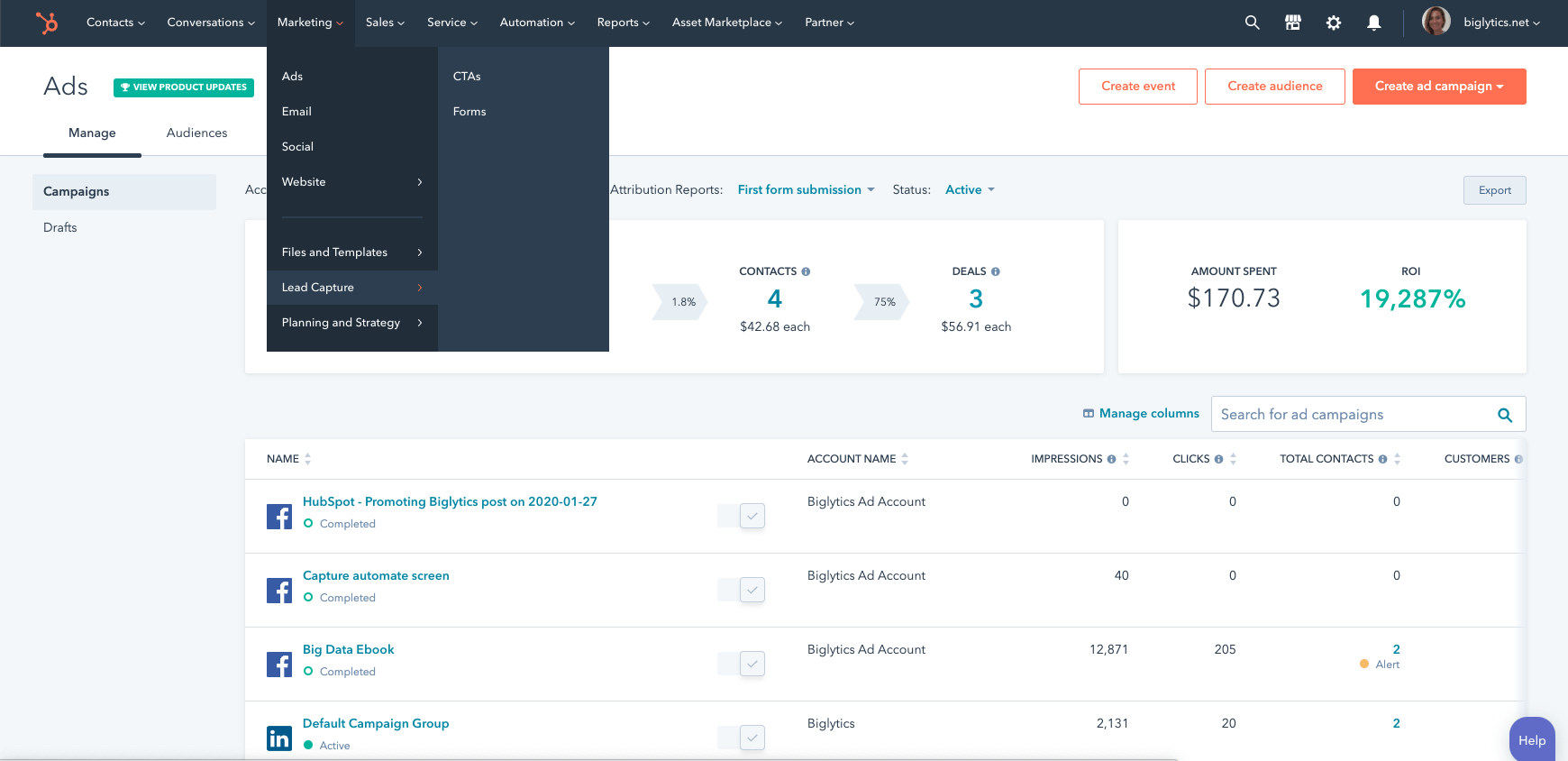
HubSpot Marketing Hub really is the beating heart of HubSpot’s appeal to online businesses.
It enables businesses to generate their own leads with bespoke form creation, comes with great customer-focussed tools like Live Chat, and it allows Facebook, Google & LinkedIn ads while integrating seamlessly with broadly used business platforms like Salesforce.
CMS Hub
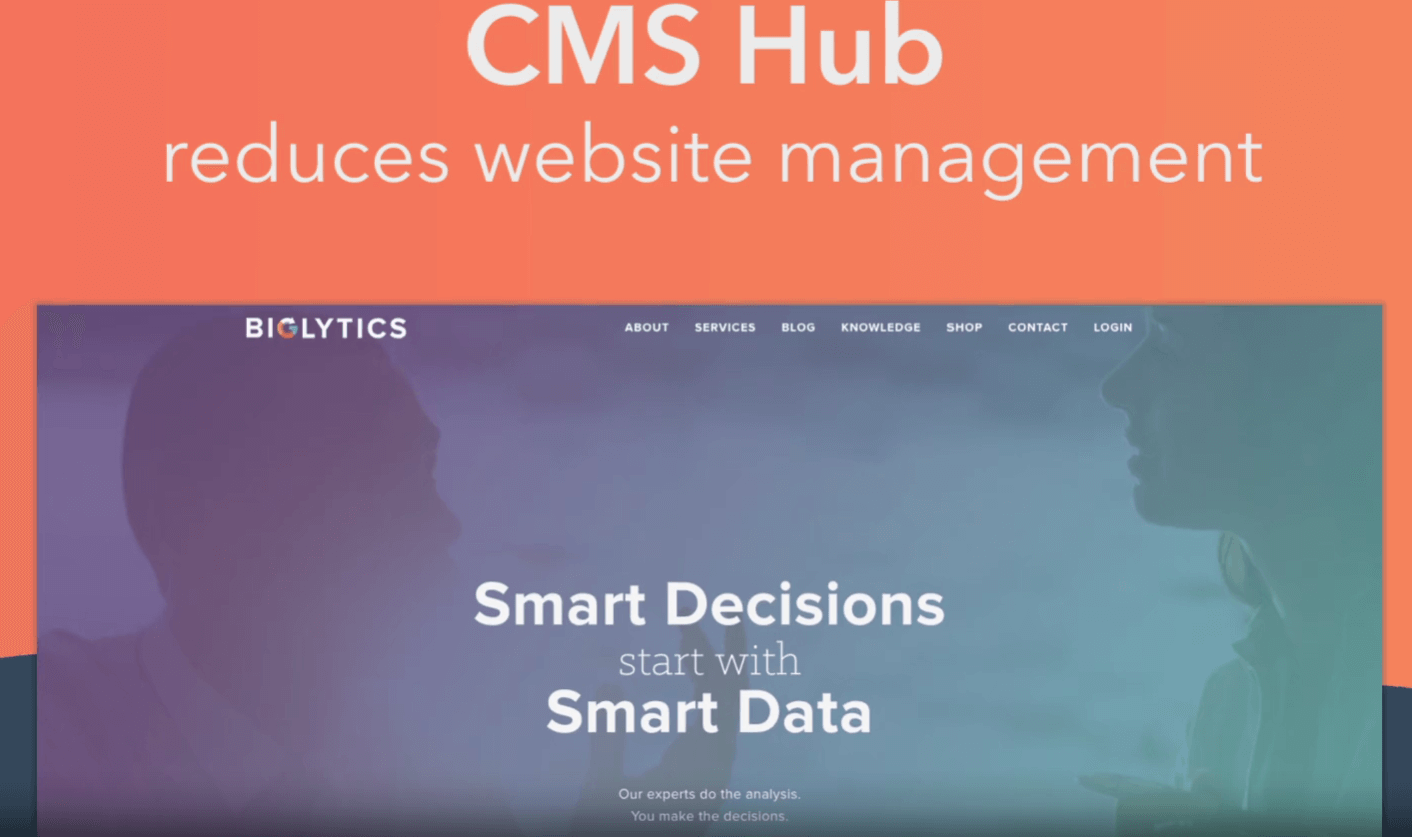
The HubSpot CMS Hub is a content management system that allows businesses to create and manage their website's content, design, and layout.
It offers a drag-and-drop editor, SEO optimization tools, and personalization features from multi-language content creation to building customized reports.
Plus it also comes with managed cloud hosting and very useful website traffic analytics.

Service Hub
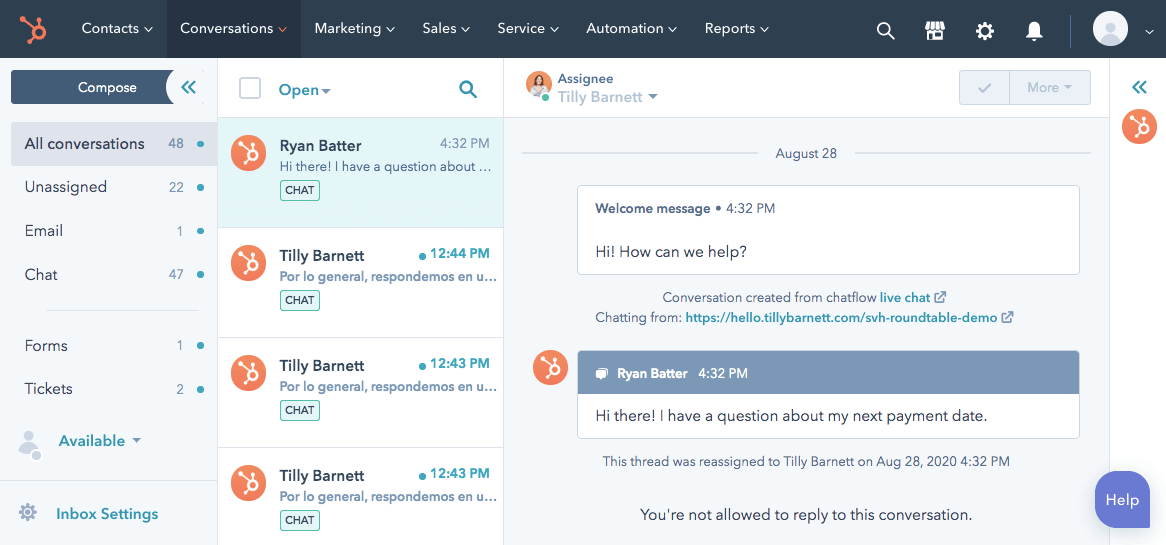
The Service Hub is HubSpot’s customer service software that helps you deepen customer relationships, connect to the front office, and drive team efficiency.
The Service Hub has a load of really helpful features, including a Knowledge Base, a Customer Portal, Omni-Channel Messaging for improved customer interactions, and Live Chat.
Pricing
HubSpot has a huge array of different pricing structures, licenses, and packages which will have little relevance to readers of this article. So, sticking to the essentials for our likely audience, here’s the pricing for building a website on HubSpot.
Free - The HubSpot Free Tools will enable anyone to build a fully functioning online site or store and includes all the basic features from the 5 hubs (Marketing, Sales, CMS, CRM, and Service). Limited to 5 users.
Starter - Includes everything included in Free with increased limits + additional themes and features | $25/mo ($23/mo with an annual subscription).
Professional - Includes everything included in Starter with increased limits + additional themes and features including smart reporting, A/B Testing, SEO recommendations, and much more| $400/mo ($360/mo with an annual subscription).
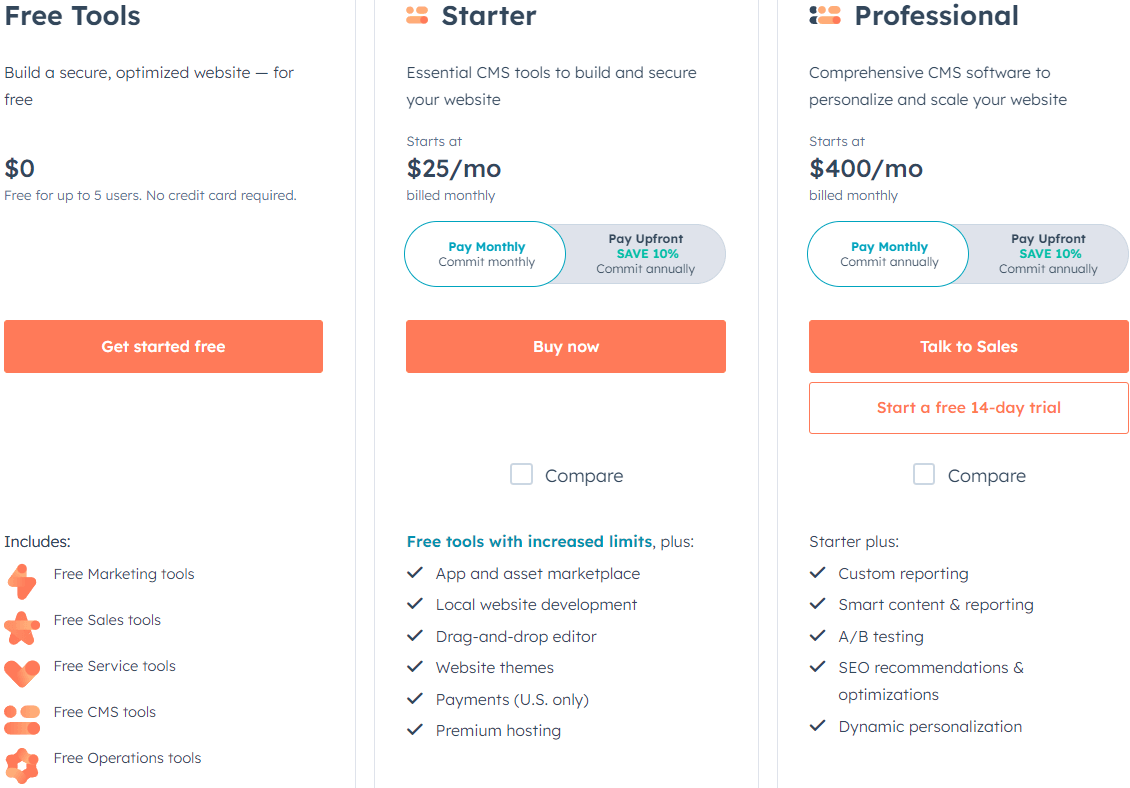
Comprehensive Guide to Hubspot Pricing
Pros and Cons
Pros
Ease of Use - anyone can build a website using HubSpot and have it up and running in no time.
Optimized for business - from SEO to marketing to customer care, HubSpot gives you everything you need.
Cons
Limited Options - despite great ease of use, with HubSpot, your options a limited to what they give you.
Lack of Scalability/Extensibility - Scaling a business will require a greater investment of time and money.
What is WordPress?

WordPress is the world’s most popular website builder with 43% of all websites online being built on the platform.
WordPress was originally created as a tool to create blogs, but because it is built using open-source technology, it was able to evolve into a complete website-building platform capable of building any kind of site from blogs to e-commerce and other kinds of business websites.
Some of the more notable sites built using WordPress include Time magazine, Sony Music, BBC America, TechCrunch, and The New York Times.

WordPress’ Key Features
Block Editor

With Block Editor you can insert text, photos, forms, Yelp reviews, testimonials, and maps, in minutes. It also displays visual elements exactly how they’ll look on your live website (desktop or Mobile), so you’ll never have to double-check which saves bags of time.
Plugins
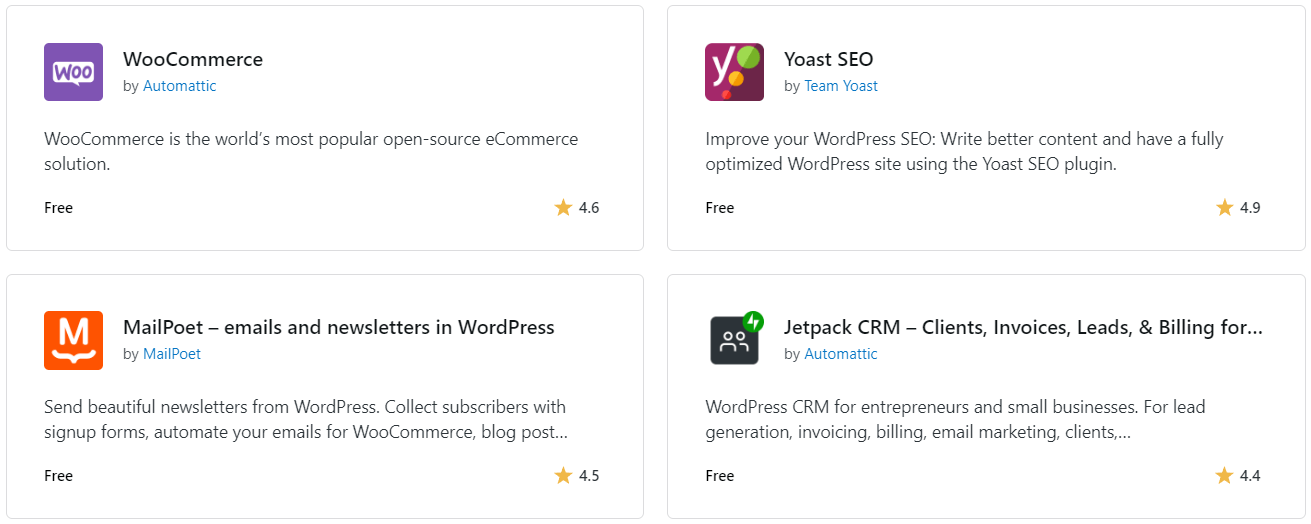
WordPress has over 48,000 plugins (free and premium) that provide you with literally everything you could ever need for your website. From CRM to Chat to Payment and Invoicing to review and feedback hubs.
Social Media Tools

Using social media to promote your business is now a prerequisite for any business. WordPress has a wide range of tools that allow you to promote your products and services across all major social media platforms with consummate ease.
Pricing
In addition to the free version (which is often sufficient for many businesses), there are 5 paid pricing plans that afford varying levels of features and support. The three most relevant are:
Personal - Includes everything included in Free + a free domain (1 year), no ads, and email support | $4/mo (annual subscription).
Premium - Includes everything included in Personal with live chat support and additional features | $8/mo (annual subscription).
Business - Includes everything included in Premium with lots of additional data, performance, and security features | $25/mo (annual subscription).
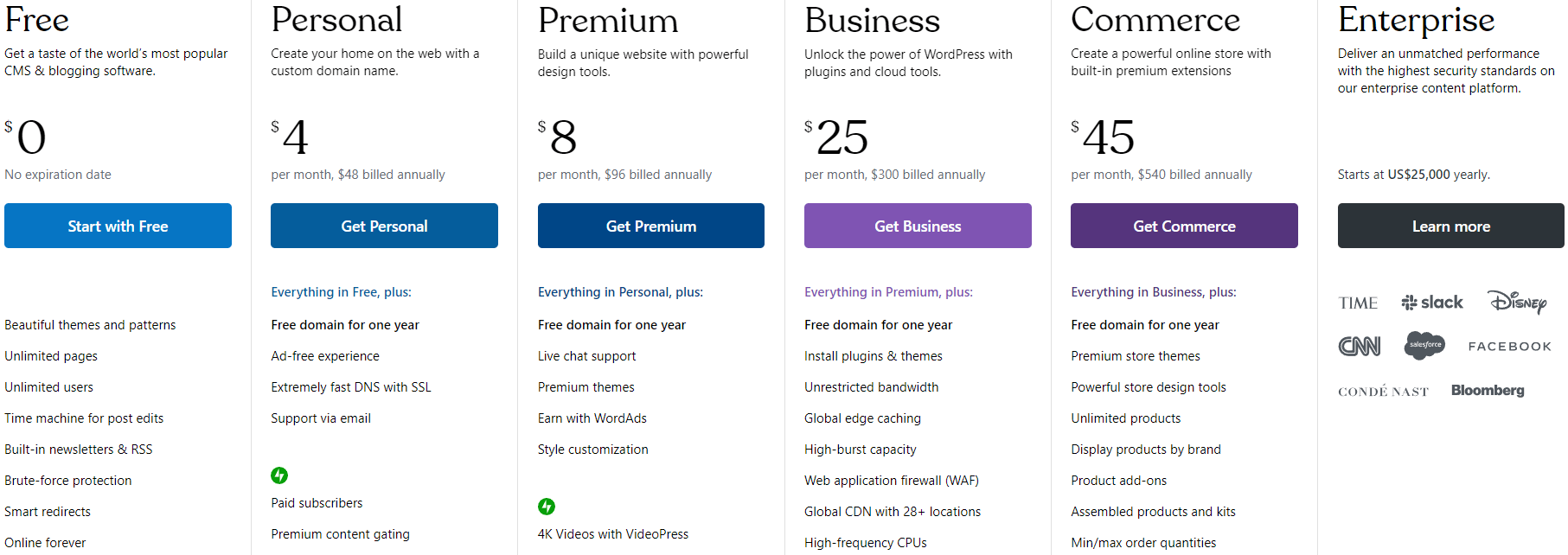
Comprehensive Guide to WordPress Pricing
Pros and Cons
Pros
Affordability - build fully functioning online businesses for free.
Flexibility - design your site to be exactly how you want it and grow it how and when you need to.
Cons
Steep Learning Curve - especially for non-coders. Researching plugins can also be time-consuming.
Many Updates to Manage - WordPress.org requires you to run the updates yourself - It’s not like Google Chrome or Apple, which just sends you updates when they are ready.
HubSpot and WordPress Alternative: Pineapple Builder
Pineapple Builder is an AI website builder created for business owners to effortlessly construct branded websites, blogs, portfolios, and newsletters. Instead of hundreds of plugins to install, you already have all the features build-in!
Having been described as a “WordPress Killer” Pineapple Builder has been resoundingly praised by both developers and co-coders alike for enabling them to build powerful websites effortlessly using the latest AI technology.
Pineapple Builder Key Features
Pineapple AI Assistant
Pineapple Builder uses the latest AI tech to assist you in numerous tasks from your design and layout to your marketing communications and content creation. It even helps you get the best SEO.
AI SEO
Generate your SEO as you go, without a hustle, leveraging AI to help you with your Titles and Descriptions which rank best. Generate your website and blog copy on the fly without
Effortlessly optimize your SEO, utilizing AI technology to enhance your Titles and Descriptions for optimal ranking. Create compelling website and blog content on-the-go without any hassle. Learn and try more about Pineapple AI Assistants.
Pineapple Analytics
Pineapple Analytics lets you see your top sources and create simple links with UTM parameters to track your link engagement. You can also set goals and it comes with a range of reports and detailed information on campaigns and conversions.
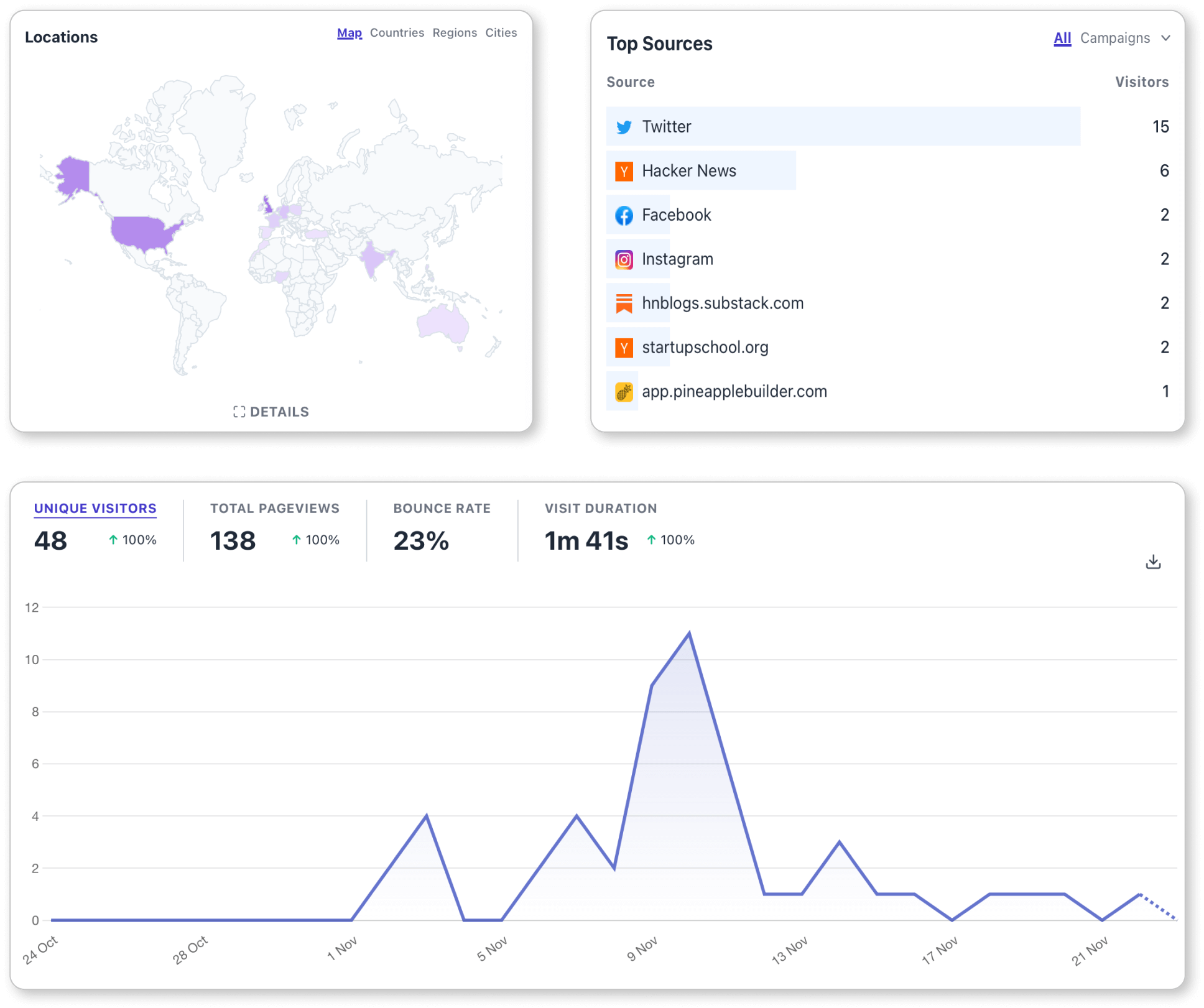
Pineapple Membership
Pineapple Membership lets you run contests, create newsletters and blog posts, share ebooks, everything you need to build a loyal customer community.
You can capture leads you’d never have seen before, all managed in a single, easy-to-use dashboard, and what’s more, Pineapple let you have an unlimited amount of members!
Pricing
STARTER (Free) - 3x live pages | Pineapple subdomain | Free SSL and CDN | 24/7 support | AI Copywriter (GPT-3.5).
BASIC - Includes everything included in STARTER + Unlimited Pages, Custom domain, Remove "Pineapple" badge, Widgets + Code Embeds, Payments, Web Analytics, AI Designer (Section Editing), AI Copywriter (GPT-4), Membership (up to 1000 customers) | $15/mo ($12/mo with an annual subscription).
GROW - Includes everything included in BASIC + Unlimited Blog Posts, AI Copywriter (Blog writing), Passwords pages (beta), Blog and Page (CMS), Membership (up to 5000 customers) | $295/mo ($24/mo with an annual subscription).
Conclusion
As options go for building a website, we’re pretty confident that you can find the perfect option for your business among these three picks.
HubSpot and WordPress both have a range of pros and cons, so make sure you take the time to evaluate them on their strengths and weaknesses.
Of course, if you are looking for an alternative option that uses the latest AI algorithms and offers game-changing website SEO and functionality that won’t cost you the earth even when you grow, you might want to give Pineapple Builder a try!

